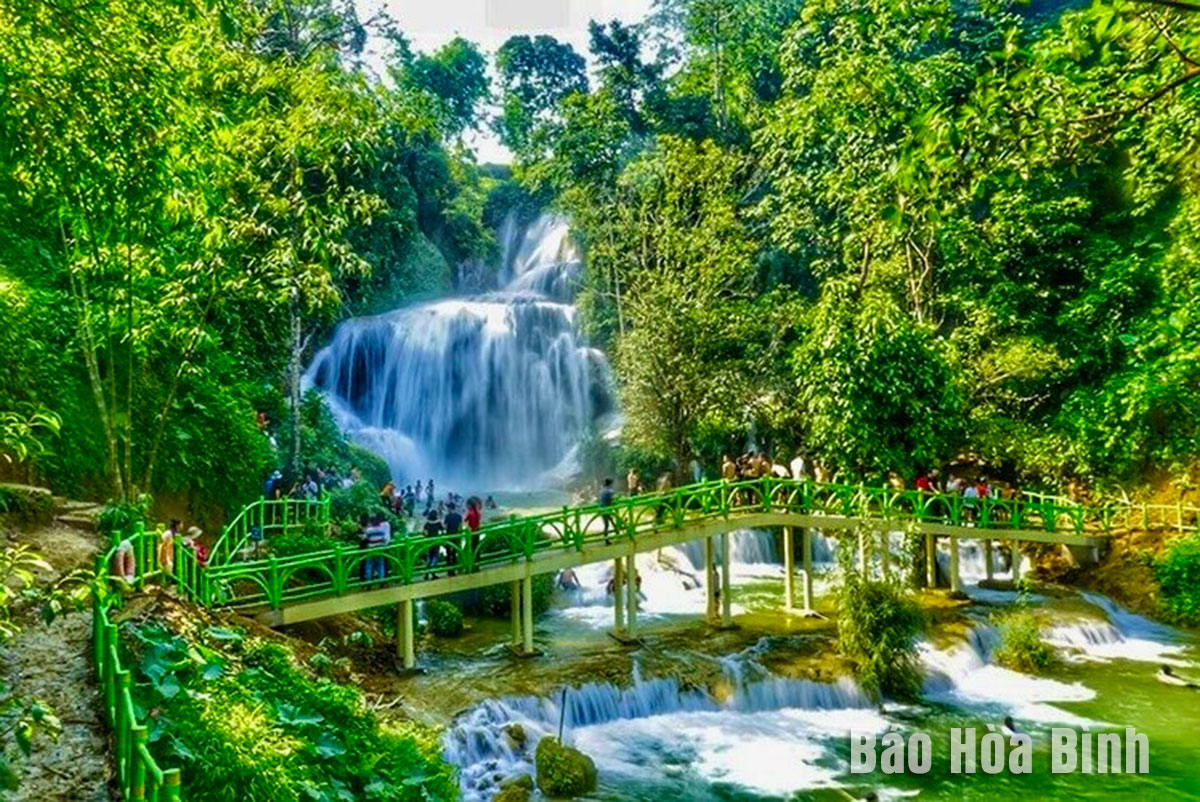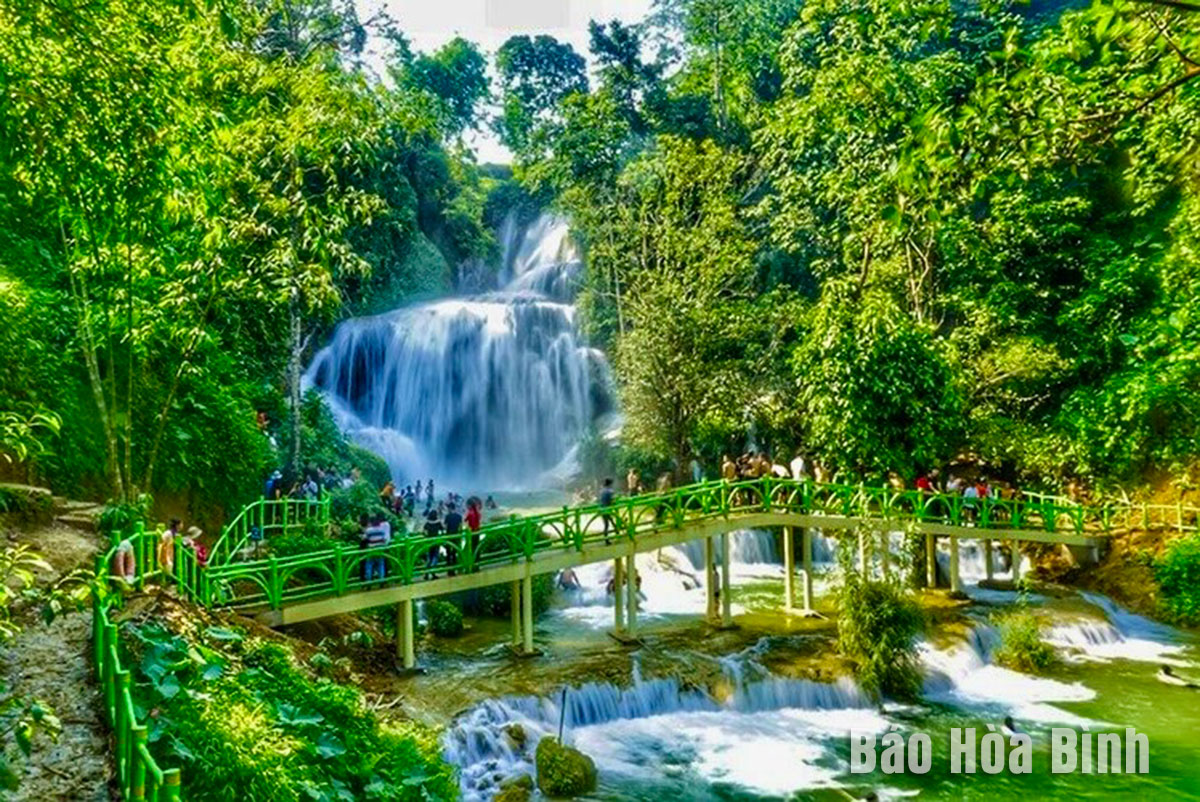
Tourism areas upgraded, images of the people, culture and tourism of the Muong Vang land further popularised, and more destinations of sightseeing and festivals formed are among the strides Lac Son district has made after three years of implementing Resolution No. 06-NQ/HU, dated July 26, 2021, of its Party Committee to turn tourism into an important economic sector.
The pristine and majestic beauty of Mu Waterfall in Tu
Do commune, Lac Son district, attracts a large number of domestic and
international visitors.
Over the past years, infrastructure for
socio-economic development, especially the facilities serving tourism, in Lac
Son has improved considerably. Utilising different capital sources, the
district has completed upgrading and expanding Road 12B and Provincial Roads
436 and 437. Many linking districts, communes, and villages have also been
paved, making the district more accessible for tourists.
As a result, local sites of natural, ecological,
and community-based tourism such as Mu Waterfall in Tu Do commune, Bai Bui – a
grassland area in Ngoc Lau commune, the Muong flower garden in Vu Binh commune,
and the terraced rice fields in Quy Hoa and Mien Doi communes are attracting
more and more visitors.
Aside from developing infrastructure and
creating conditions for organising festivals, the district has also paid
attention to holding tourism promotion events and bringing into play the local
cultural identity. Communications and promotion activities have been
diversified such as opening booths at exhibitions; coordinating with the Mass
Culture Department under the Ministry of Culture, Sports and Tourism and
central press agencies to produce films and documentaries about local culture
and tourism; and working with press outlets of Hoa Binh province to introduce
landscapes, historical and cultural relic sites, and traditional festivals of
Lac Son.
The district is currently home to two hotels
with star ratings, 24 accommodation establishments, and 17 community-based
hostels.
Some tourist destinations have also had their
infrastructure properly invested such as Coi Communal House in Vu Binh commune,
Khoi Communal House in An Nghia commune, the relic site of Regiment 52 (Tay
Tien Regiment) in Thuong Coc commune, and Khenh Communal House in Van Son
commune.
Besides, the postal and telecommunications
system and the information technology network, including transceiver stations,
now cover all local tourism areas and destinations, ensuring convenience for
travellers to keep communication and search for information.
Bui Van Kia, Standing Vice Secretary of the
district Party Committee and Chairman of the district People’s Council, said by
implementing the resolution, local tourism has been flourishing as seen in the
growing number of visitors. Apart from domestic tourists, some community-based
tourism sites in Tu Do and Quyet Thang communes have also welcomed thousands of
international travellers.
Lac Son aims to become one of the centres of
high-quality leisure and wellness tourism in the northern mountainous region
and Vietnam by 2030 by capitalising on its quality hot spring potential,
beautiful natural landscapes, the fresh environment, the northern region’s
biggest artificial freshwater lake, and its unique culture.
To that end, it will strongly carry out such
measures as stepping up tourism promotion, creating conditions for businesses
to invest in tourism with a focus on ecological and community-based tourism,
and enhancing cooperation with localities and businesses to develop attractive
tourism products, according to the official.
A diverse chain of eco-tourism and resort destinations concentrated in Hoa Binh city and the districts of Tan Lac, Da Bac, and Luong Son… Along with the launch of several key high-quality resort tourism projects, these developments have reshaped the landscape and enhanced the appeal of Hoa Binh as a travel destination.
Boasting diverse terrain, a mild climate, and rich natural resources, Cao Phong district is increasingly asserting its place on Vietnam’s tourism map, attracting both domestic and foreign visitors. The district is renowned for its stunning landscapes, majestic mountains, a crystal-clear hydropower lake, and the unique cultural identity of local ethnic groups.
With its pristine landscapes, unique cultural heritage of Muong ethnic minority, and an expanding range of visitor experiences, Tan Lac district of Hoa Binh has fast become a captivating destination for both domestic and international tourists.
Until now, Sung village in Cao Son commune, Da Bac district remains the only Dao ethnic community in Hoa Binh province to develop a community-based tourism model. Beyond its untouched natural landscapes, cultural identity serves as the cornerstone attraction for visitors.
Alongside the diverse cultural identities of the Kinh, Muong, Tay, Thai, Dao, and Mong ethnic people, Hoa Binh province is also renowned as the "capital" of the northwestern Vietnamese cuisine, offering unique and distinctive dishes. At festivals, during Lunar New Year (Tet), or on significant family or community occasions, special dishes are prepared, leaving a lasting impression on visitors.
A Phong Linh (Yellow Tabebuia) flower garden in Thang village, Thach Yen commune, Cao Phong district is currently in full bloom, drawing a large number of visitors.



